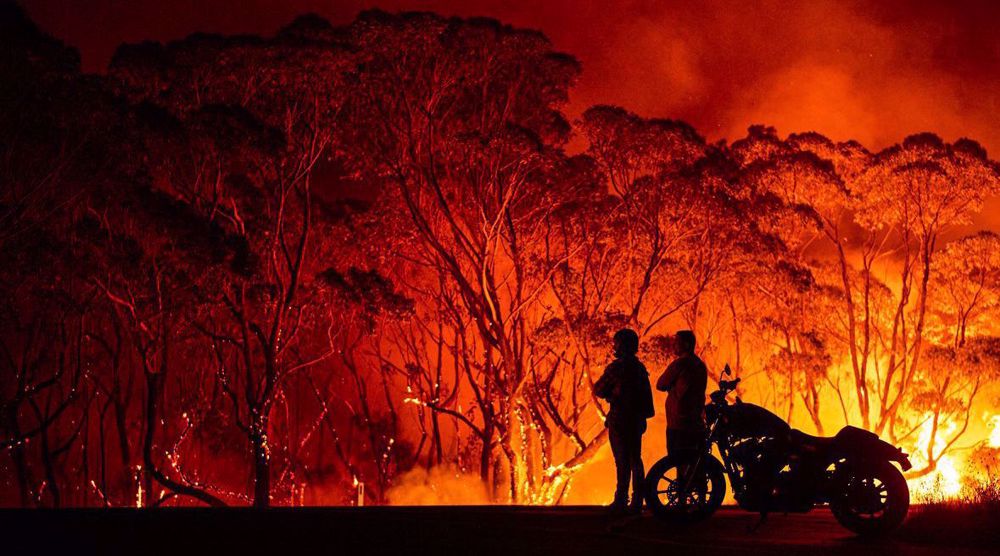Climate change could become a ‘catastrophic’ threat to global security: US security experts
US national security and intelligence experts have warned that climate change could become a “catastrophic” threat to global, national security, according to a new report.
“Even at scenarios of low warming, each region of the world will face severe risks to national and global security in the next three decades,” experts wrote in a report released on Monday by the National Security, Military and Intelligence Panel of the Center of Climate and Security.
“Higher levels of warming will pose catastrophic, and likely irreversible, global security risks over the course of the 21st century,” the Hill reported.
The study warns that all levels of global warming of climate change will pose “significance and evolving threats” to security environments, infrastructure and institutions across the world.
Experts said that the most fragile parts of the world are most at risk, but all regions face “serious implications,” adding that high warming scenarios could bring “catastrophic security impacts across the globe.”
“These threats could come about rapidly, destabilizing the regions and relationships on which U.S. and international security depend,” the experts found, according to the report.
The report said the world needs to quickly reduce and phase out “global greenhouse gas emissions,” and urged all nations to reach net-zero global emissions “as soon as possible.”
The experts also called for “renewed efforts to prioritize, communicate and respond to climate security threats, and to integrate these considerations across all security planning,” in the United States.
“It’s the job of the U.S. intelligence community to anticipate risks to national security, and provide strategic warning to appropriate policymakers,” said Rod Schoonover, who co-authored the report and advisory board member of the Center for Climate and Security.
“The science has long been clear, and the security community is adding compelling analysis of the threats climate change pose to people and nations. It’s long past time for vigorous action to address them.”
Several recent reports have raised alarm about climate change and its devastating impact on the US economy and its population.
Climate change will shrink US economy and kill thousands, a US government report has warned, contradicting the comments by US President Donald Trump who repeatedly doubts climate change as a hoax.
In June 2017, Trump announced that he was pulling out of the 2015 global agreement to fight climate change, characterizing the decision as "a reassertion of American sovereignty."
The move drew rebuke from Democrats at home and world leaders who had pressed Trump not to abandon the 197-nation accord.
He argued that remaining in the deal would hurt the US economy. Trump cannot formally leave the deal until a day after the 2020 election.
Trump considers climate change a hoax
Trump had vowed during the election campaign to "cancel" the Paris agreement within 100 days of becoming president on January 20, 2017 in order to bolster the US oil and coal giants, which bankrolled his campaign.
Trump has labeled climate change a hoax, defying widening international support for the Paris agreement to cut greenhouse gas emissions. He has argued that the concept of global warming has been “created by and for the Chinese in order to make US manufacturing non-competitive.”
Environmental groups have long argued against spending billions of dollars to reduce emissions from coal-fired power plants when the same funds could help expedite the transition to wind and solar power.
The Paris agreement was reached on November 4, 2016 and has been signed by 197 countries. 135 of them have now formally ratified the agreement. They represent more than 75 percent of global greenhouse gas emissions.
The Paris agreement seeks to avert climate change by limiting global warming to no more than 2 degrees Celsius (3.6 degrees Fahrenheit) above pre-industrial temperatures by 2050. It also sets out a goal of reaching a limit of 1.5 degrees Celsius, if possible.
The adopted text acknowledges that the risks of climate change are much more serious than previously thought. The deal is to take effect in 2020.
Iran FM: Success of nuclear talks hinges on ‘seriousness’ of US
Pro-military Israeli journalist detained on suspicion of raping child: Reports
Anthropic resists US War Department push for unrestricted AI access
Iran naval unit returns from drill, cmdr. vows to defend borders to ‘last breath’
VIDEO | Press TV's news headlines
Paris silencing pro-Palestine voices
Iran raises alarm at ‘environmental consequences’ of US militarism
Iran: UN Security Council inaction on Israeli crimes ‘catastrophic’










 This makes it easy to access the Press TV website
This makes it easy to access the Press TV website